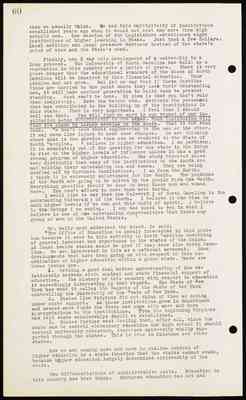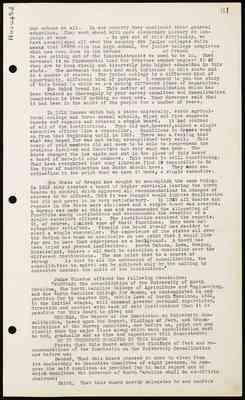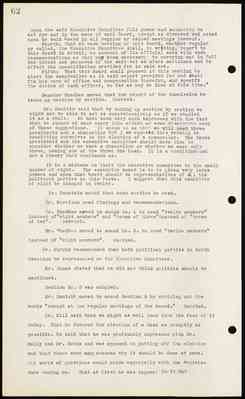Pages
60
than we usually think. We had this multiplicity of institutions established yeans ago when it would not cost any more than high schools now. One session of the Legislature established eight institutions of higher learning in Texas. Just took a few dollars. Local ambition and local pressure dominate instead of the state's point of view and the State's need.
Finally, may I say this development of a university is a long process. The University of North Carolina has built up a reputation in this country over a period of years. There is very grave danger that the educational standard of the State of North Carolina will be impaired by this financial situation. Your problem and not mine. But let me say that if these institutions are carried to the point where they lose their outstanding men, it will take another generation to build back to present standing. Just can't be done. My plea is that you don't ruin them completely. Save the better men. Maintain the personnel that has contributed to the building up of the institutions in this state. That is very important. I feel that I should tell you that. You will find no word in our report of one instituiion being subordinated to the other. Each institution will find its place by larger service to the state. That is the real task. We don't talk about engineering to the one or the other. It may seem like injury to make some changes. We are thinking about what is the service than can be rendered to the State of North Carolina. I believe in higher education. I am partisan. It is absolutely out of the question for any state in the Union to rise to the higher levels of influence unless it has a good strong program of higher education. The study reported shows very distinctly that many of the institutions of the South are not holding their outstanding men and women. They are being drafted off by Northern institutions. I am from the North. I think it is extremely unfortunate for the South. The problems of the South are going to be solved by the people form the South. Everything possible should be done to keep these men and women here. You can't afford to have them move North.
I would like to say that the University of North Carolina is the outstanding University of the South. I believe it can rise to much higher levels if we can get this unity of spirit. I believe in the things I am saying. I say God speed to you in what I believe is one of the outstanding opportunities that faces any group of men in the United States."
Dr. Kelly next addressed the Board. He said:
"The Office of Education is keenly interested in this proplem because it sees in this activity in North Carolina something of general interest and inportance to the states of the Union. At least twelve states would be glad if they were like North Carolina. We are interested in this as a national movement. Some developments that have been going on with respect to this coordination of higher education within a given state. There are three trends now.
1. Getting a good deal better understanding of the relationship between state control and state financial support of education. The history of this country with respect to education is exceedingly interesting in that regard. The State of New York has what it called the Regents of the State of New York controlling the University of the State of New York.
2. States like Virginia did not think of them as coming under state support. As those institutions grew in importance and needed more funds the State has come with more and more appropriations to the institutions. From the beginning Virginia has felt state scholarships should be established.
3. States further west feeling that, after all, since the state was to control elementary education and high school it should control university education, therefore university wholly supported through the states. This is true in Oklahoma and other states.
Now we are coming more and more to realize control of higher education is a state function that the states cannot evade, because higher education largely determines citizenship of the state.
Two differentiations of administrative units. Education in this Country has been topsy. European education has not had
61
our scheme at all. In our country they continued their general education. They went ahead with more elementary history or language or some . To get out of this difficulty, we have established all over the country 485 junior colleges which means that taken with the high school, the junior college completes what has been done in the German or French . We are getting out of the inconsistencies we used to be in. That movement is so fundamental that the trustees cannot neglect it if they are to look wisely and discreetly into higher education in this state. The movement has not had much influence in this state and in a number of states. The junior college is a different kind of opportunity, different kind of purpose. I commend to you the study of this trend in which we are making different lines of separation.
The third trend is: This matter of consolidation which has been treated so thoroughly by your survey committee and Consolidation Commission is itself nothing so very new. Your Governor said that it had been in the minds of the people for a number of years.
In 1912 Kansas which had a state university, state agricultural college and three normal schools, wiped out five separate boards and regents and created a single board. It had control of all of the institutions. They did not, however,select a single executive officer like a chancellor. Conditions in Kansas went on from that beginning until in 1923. There was a feeling that what was hoped for was not being accomplished very well. This board of paid members did not seem to be able to comprehend the problems involved and therefore not very much was done. The State changed the law again and put in the place of this board a board of non-paid nine members. This board is still functioning. They have recognized that they likewise find it impossible to do the type of coordination the State should have. They want coordination to the point that we have it here, a single executive.
The State of Oregon has sought to accomplish the same thing. In 1912 they created a board of higher curricula leaving the three boards in control which approved all recommendations in changes of courses to be offered. This it was thought would improve duplication but did not prove to be very satisfactory. In 1929 all boards and regents in the State were abolished and a single board was created. A survey was made as this one and recommended the allocation of functions among institutions and recommended the creation of a single executive officer. The institution received the reports. It, of course, limited some of their functions. They were not altogether satisfied. Finally the board Itself has decided to elect a single chancellor. The experience of the states all over the Nation has been so conclusive on one point that I would like for you to have that experience as a background. A board has been tried and proved ineffective. North Dakota, Iowa, Oregon, Mississippi, Kansas - all want to establish a chancellor over tne different institutions. The one point that is a source of strong is that in all the movements of consolidation, the consolidation in spirit can be achieved only by the uniting by executive control the units of the institution."
Judge Winston offered the following resolution:
"WHEREAS: The consolidation of the University of North Carolina, The North Carolina College of Agriculture and Engineering, and the North Carolina College for Women, as contemplated in and provided for by chapter 202, Public Laws of North Carolina, 1931, in the initial stages, will denmand greater personal supervision, direction and contact with each of said institutions uhan it is possible for this Board to give; and
WHEREAS, The Report of the Commission on University bonsolidation, based upon the Report, Findings of Pact, and Recommendations of the Survey Committee, now before us, point out and clearly show the major lines along which such consolidation must be had gradually and as time and experience will demonstrate;
BE IT THEREFORE RESOLVED BY THIS BOARD:
First: That this Board adopt the findings of fact and recommendations of the Commission on the University Consolidation now before us;
Second, That this Board proceed at once to elect from its membership an Executive Committee of eight persons, to compose the said committee as provided for in said report and of which committee the Governor of North Carolina shall be ex-officio chairman;
Third, That this Board hereby delegates to and confers
62
upon the said Executive Committee full power and authority to act for and in the name of said Board, execpt as directed and acted upon by said Board in all regular or called meetings thereof.
Fourth: That at each meeting of this Board, whether regular or called, the Executive Committee shall, in writing, report to this Board in detail, an account of its official acts with such recommendations as they may deem necessary to carrying out in full the intent and purposes of the said Act as afore mentioned and to effect the consolidation provided for in said act.
Fifth: That this Board shall proceed at this meeting to elect the comptroller as in said report provided for and ahall fix his term of office and compensation therefor, and specify the duties of such officer, so far as may be done at this time."
Senator Whedbee moved that the report of the Commission be taken up section by section. Carried.
Mr. Daniels said that by taking up section by section we might not be able to act as comprehensively as if we studied it as a whole. We have been very much impressed with the fact that we cannot at once carry into effect or even disapprove many of these suggestions. It seems to me that we will need three presidents and a chancellor but I am opposed this morning to committing ourselves to the election of a chancellor. The three presidents and the executive committee should have time to consider whether we want a chancellor or whether we want only three, making one of the three the head. It is a condition and not a theory that confronts us.
It is a mistake to limit the executive committee to the small number of eight. The executive board is to be given very large powers and upon that board should be representatives of all the political parties in this State. I suggest that this committee of eight be changed to twelve.
Mr. Fountain moved that each section be read.
Dr. Morrison read findings and recommendations.
Mr. Whedbee moved to amend No. 1 to read "twelve members" instead of "eight members" and "terms of three" instead of "terms of two". Carried.
Mr. Whedbee moved to amend No. 2. to read "twelve members" instead of "eight members". Carried.
Mr. Murphy recommended that both political parties in North Carolina be represented on the Executive Committee.
Mr. Jonas stated that he did not think politics should be mentioned.
Section No. 3 was adopted.
Mr. Daniels moved to amend Section 4 by striking out the words "except at the regular meetings of the Board." Carried.
Mr. Hill said that we might as well look into the face of it today. That he favored the election of a head as promptly as possible. He said that he was profoundly impressed with Dr. Kelly and Dr. Works and was opposed to putting off the election and that there were many reasons why it should be done at once. All sorts of questions would arise especially with the Legislature coming on.
That at first he was opposed to it but
63
in the last day or two had become in favor of it and thought that if we were going to do anything at all today was the time and that he would like to hear Mr. Dahiels give his views on why he wanted it postponed.
Mr. Daniels said: "There is no proposition before you to act now and I think that after we have considered this matter we shall be able to choose from among the three men who are now presidents, or will be presidents of these three nortions of the university a man who will be president of the whole business. Do not have four when we can have three executives. One of these three men will probably be head of the whole system. We must have a head, but do not wish to commit ourselves to four high executives when we might wish to have three later - or perhaps two."
Mr. Hill said: "This matter should be settled today. What kind of a man and single head do you have in mind? A chancellor is not a czar, not a man of absolute power. His job is to bring these institutions into a merger, not into a consolidation at once. The chancellor is to consider the needs and ambitions, purposes, financial situation, and thousand of other pertaining to these institutions. Today is when you need a master mind and not tomorrow. If we are going to have these three institutions merged by one master mind, let's get to work and select him. Can you expect the Board of Trustees fo meet again immediately to study these questions and present a plan? We cannot get together because we would spend the whole time in discussion. Until we reach that stage, we will not make any progress. Dr. Works is an intelligent man and sees things differently. I favor the election of a chancellor as soon as possible and leave these three presidents as they are."
Mr. Whedbee moved that five and six be adopted as recommended by the committee. Seconded by Mr. Hill but not carried.
Judge Townsend said: "The Commission has studied this question very carefully and recognized the difficulty that Mr. Hill spoke about. We also realized that each of these three presidents in running his particular institution after this consolidation is going to have a man-size job of his own. You have got to have an executive head of each institution. They have got to be run. We thought that the presidential directorate, the triumvirate, could run these together, but we realize that the three presidents would be partial or they would not be fit for the job. There are going to come times when views will conflict. If you are going to get all these institutions to work in harmony you must have one head. This head ought to be a man who sees all three at one time one who sees the whole State, and who will so guide these institutions that all activities will be for the good of North Carolina. He ought to be responsible to the Board of Trustees. When the Executive Committee meets, problems are brought up of which they have never heard. They must take someone's word. They must take the President's word and exercise their judgment accordingly. With three heads there would be contention and the Executive Committee would have to make a study of the problems. There should be one head to whom the three presidents should present their problems. Of course, these three men could still come to the Board but they would have the word of an impartial man. We won't get the benefit until we have one responsible head who is responsible to this Board, who will give you the best study he is capable of and present the matter according to his best judgment and then you can study it from that angle. The committee felt that they should present this to the Board that before you get the good out of this you will have to have one responsible head and that they should go on recommending this. That in their judgment you would never get the best out of consolidation unless you select one head to whom the Board of Trustees should look. It gets the thing away from partisanship. If you take one president away and make him president of all of them, you will have friction. If you have one man who is big enough to see all these institutions and attempt to guide their activities in one direction and the Board can rely on his
64
on his judgment, you have gone a long way toward solving this problem. Some time should be taken in selecting the right kind of a man, it should not be entered into hastily."
Mr. Murphy thought that it would be unwise to select today, that the Board of Trustees should be given time to think before rushing headlong into a selection and that this was not an opportune time.
Mr. Haywood Parker agreed with Mr. Murphy and believed that we could not rely on three heads to carry out this consolidation. He recommended the adoption of the section under consideration, but that the election of a chancellor be not gone into.
Mr. Hinsdale asked: "Do you think that under the bcoad powers given the Executive Committee, they would have power to select a chancellor?"
Mr. Madry stated that he did not favor a chancellor and three presidents. That the people would think they were creating a new and useless office. He suggested a president and three vice-presidents. He moved that section six be amended so as bo make the word "chancellor" read "president" and the word "president to read "vice-president."
Seconded by Mrs.Cone who said that she thought personalities should not enter into the consolidation.
Dr. Maddry asked Dr. Works if that was his original recommendation.
Dr. Works said: "We recommended that because we believed it to be the best thing. We considered it in the Commission but were entirely impersonal."
Dr. Maddry said;" The reaction I have had is just what I said. I feel like we have created a new and useless office. The reaction of North Carolina is against it, I believe. It will be a handicap if you have a chancellor and three presidents. If we are going, let's go all the way."
Mr. Haywood Parker asked. Dr. Maddry if he favored ane head and he said that he did.
Mr. Haywood Parker moved that section 5 be amended by




